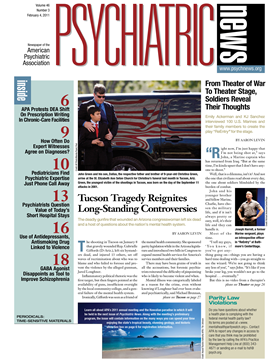Scores of brain-imaging studies have shown that when people experience a first episode of schizophrenia, their entire brain volume as well as the volume of their prefrontal lobes and temporal lobes in particular are reduced compared with the volume of “normal” brains.
These findings strongly support the view that schizophrenia is caused by underlying brain abnormalities. But if this is the case, then when do such abnormalities start, and what form do they take?
A new study conducted in Scotland may provide at least part of the answer. It has found that the entire brain volume loss and loss in prefrontal lobe and temporal lobe volume already exist several years before the first episode of schizophrenia occurs, and that the reduction in prefrontal lobe volume is particularly pronounced during that time.
The study, headed by Andrew McIntosh, M.D., a reader in psychiatry at the University of Edinburgh, was reported online December 20, 2010, in Biological Psychiatry.
The study was called the Edinburgh High Risk Study. McIntosh and his colleagues recruited 162 individuals at high genetic risk of schizophrenia as well as 36 control subjects without schizophrenia risk factors. All subjects had at least two first- or second-degree relatives with schizophrenia and were aged 16 to 25. The controls were matched on sociodemographic factors, but had no personal or family history of psychotic illness.
All individuals who entered the study received extensive clinical and psychological assessments and a structural MRI brain scan. During the next 10 years, at two-year intervals, subjects were followed clinically and given additional MRI brain scans.
Out of the 162 subjects at high genetic risk for schizophrenia, 17 developed the illness during the study period. None of the controls did. The researchers then compared brain-scan findings over time for control subjects, subjects at high genetic risk of schizophrenia who did not develop the illness, and subjects at high genetic risk who did develop it.
The subjects at high genetic risk of schizophrenia who did not develop the illness, as well as those at risk who did develop it, showed significantly greater reductions in whole brain volume and in prefrontal and temporal lobe volume than did control subjects. But the subjects who developed schizophrenia showed an even more dramatic reduction in prefrontal lobe volume than did subjects at high genetic risk of schizophrenia who did not develop it.
Moreover, in the high-risk subjects who became ill, significant correlations were found between increasing numbers of hallucinations and delusions and decreasing prefrontal and temporal lobe volume.
“Our results indicate that subjects at increased genetic risk of developing schizophrenia exhibit widespread neurodevelopmental differences compared with healthy control subjects and that some more specific longitudinal changes commence years before diagnosis and are associated with increasing symptom severity in those who become ill,” the researchers concluded.
The study was funded by the U.K. Medical Research Council, the U.K. Health Foundation, NARSAD, and several private foundations.
